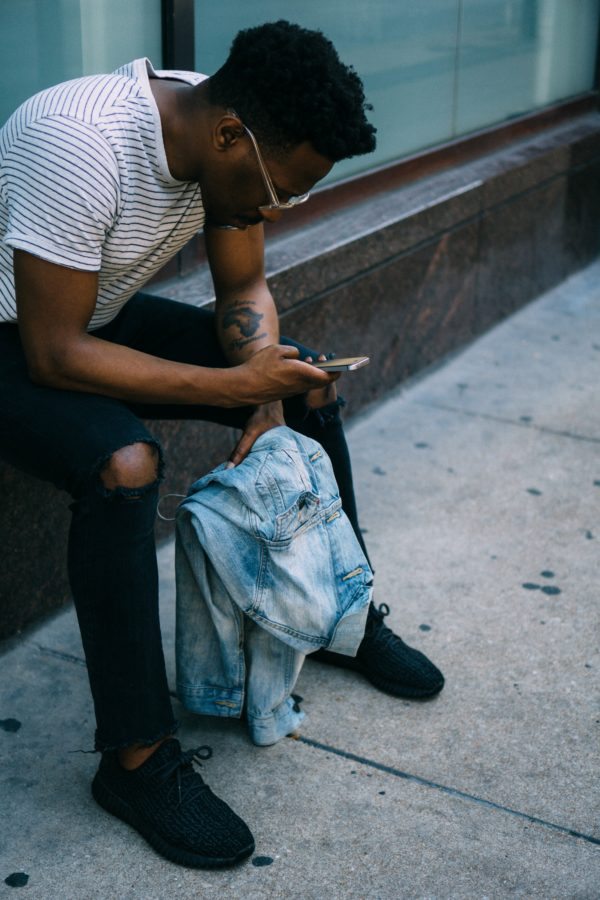We ended 2016 with a compilation of our best pieces of the year. The first month of 2017 is gone but it wasn’t arid: there was writing that caught our attention, and both the LGBTIQ group 14 and Afreada magazine released beautiful anthologies.
Here are our must-read selections, an unranked list.
They’re all online so click on and start reading.
***
1. “Kentish Town” | By Chibundu Onuzo | Daily Express
With her second novel Welcome to Lagos just reviewed by Helon Habila, Chibundu Onuzo opened 2017 with this straightforward tale of romance that touches just about every Millennial obsession from Instagram to weight-watching to Netflix to hashtags to Marvel movies to social media stardom. “At 11.59pm, the music went off and I counted down into the New Year with Aramide’s hip pressed into mine, the flesh of her arm and thigh warm against my side.” Brief and poignant.
2. “Triptych: Texas Pool Party” | By Namwali Serpell | Triple Canopy
Namwali Serpell’s short story about the 2015 McKinney, Texas pool party incident in which a police man tackles and restrains a 15-year-old black girl is a compendium of chatty, lyrical prose. “The heat rises up, sings against the skin.” “All of this beauty, all of this rolling, dipping brown flesh, like desert dunes in the shadow or desert dunes in the sun.” It is divided into three parts: “Summertime,” told by the tackled girl; “Perseus,” told by the tackling police officer; and “What Was Said,” a collection of on-the-spot reactions. In deciding to also present the officer’s perspective, Serpell allows the incident to take full shape, its implications starker: “Just as an eagle spies in an empty field a snake sunning itself and strikes from the rear, securing with eager claws the writhing scaly neck lest the snake turn with its deadly fangs—thus do I, swooping headlong through the void, attack her from behind.”
3. Q & A with Yaa Gyasi | The Guardian UK
Fresh from winning the National Book Critics Circle’s John Leonard Prize for Homegoing, Gyasi answers questions on the story behind her novel, the inspiration of her family, the continuous trauma of slavery, and what home means for her. “Slavery,” she says, “affects us still.”
4. “Obama” | By Ben Okri | The Guardian UK
In 694 words of poetry, Ben Okri’s eulogy for Barack Obama collects insights into the significance of his presidency. “Sometimes the world is not changed/ Till the right person appears who can/ Change it. But the right person is also/ In a way the right time.” His words are familiar, the thoughts they codify beautiful.
5. “bodies: how to keep a distant relationship” | By Chibuihe Obi | 14: An Anthology of Queer Art: Volume 1: We Are Flowers
Chibuihe Obi’s remarkably-structured poem examines the making of a man’s loneness as well as his adaptation to it. “1. I’ll begin by teaching my body the language of grief,” he begins, “how to love loneness like black coffee or/ black chocolates or black suds or soda/ (/add/ black/ naked/ bodies/).” It is a song of need. “15. that distance is a bird with broken wings and migrating south in summer will not save a body/ bent on burning out itself with the naked images of strange men/ (add/black/naked/male/bodies).”
6. “How To Write about Northern Nigeria” | By Pwaangulongii Daoud | Brittle Paper
Modeled on Binyavanga’s iconic Granta essay, “How To Write about Africa,” Pwaangulongii Daoud calls out the monochromatic representation of Northern Nigeria in literature. “Your main character should be an imam, or a beggar, or farmer, or a herdsman…an illiterate and a Muslim,” he satirizes. “You must avoid complex plot(s) and toughened language: the Northerner is simple in thought, frail in worldview and philosophically poor, and should not be portrayed in “high Literature”. Use: ‘Childish’, ‘innocent’, ‘victim’, ‘Docile’, ‘Frivolous’, ‘Trifling’, and maybe ‘Silly’ to describe him.”
7. “On Such Days” | By Umar Turaki | Afreada Photo-Story Book
Umar Turaki’s imagination of the life of a hawker-girl in a photo is rendered with wholeness and in beautiful prose. “It undresses itself in a graceful dance,” he begins, describing the peeling of an orange, “twirling round and round, shedding off skin in one endless strip of yellow curl, until it is a perfect ball of whiteness.” It won Afreada‘s photo-story competition.
8. “Gay Wars: Battle of the Bitches (or, The Tops and Bottoms of Being Out in Nigeria)” | By Rapum Kambili | 14: An Anthology of Queer Art: Volume 1: We Are Flowers
Grounded in wit, Rapum Kambili’s personal essay in We Are Flowers grapples with the divisive attitudes of the gay community, from the internalized-yet-subtle homophobia to the lack of apology about their identity. “Someone once asked, ‘Have you ever faced rejection upon coming out?’ The worst I’ve gotten: ‘We have to pray about it. It’s not of God.’ The bad: ‘I don’t believe you.’ The good, from an older friend, a spiritual mentor when I was still in the spirit, a wise lady: ‘I will listen just as you have asked me to.’ The better: ‘I kept thinking about it, and you’re still Rapum.’ The best, from my brother, Ulonna: ‘Is that your boyfriend @ dp?’” An often-humorous read.
**********
Post image by Derick Anies via Upsplash









COMMENTS -
Reader Interactions